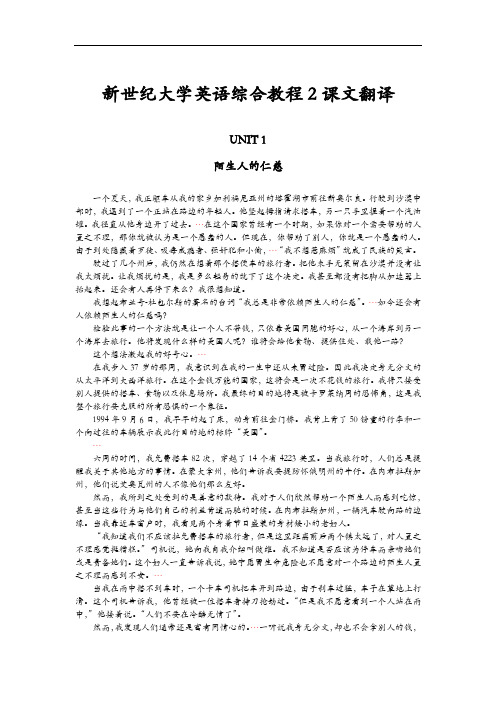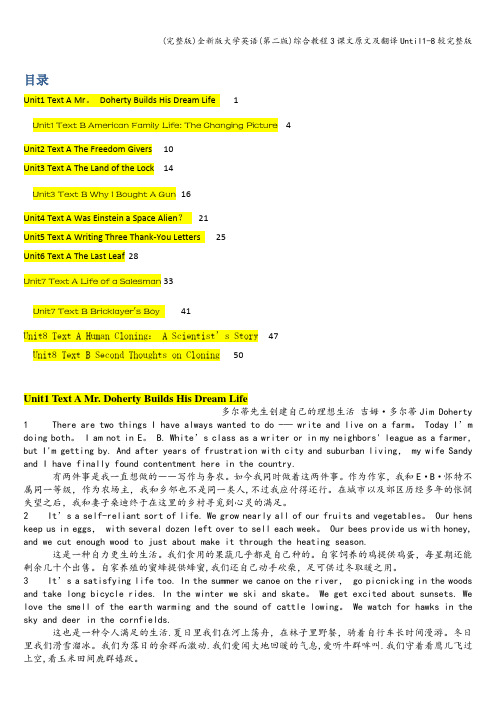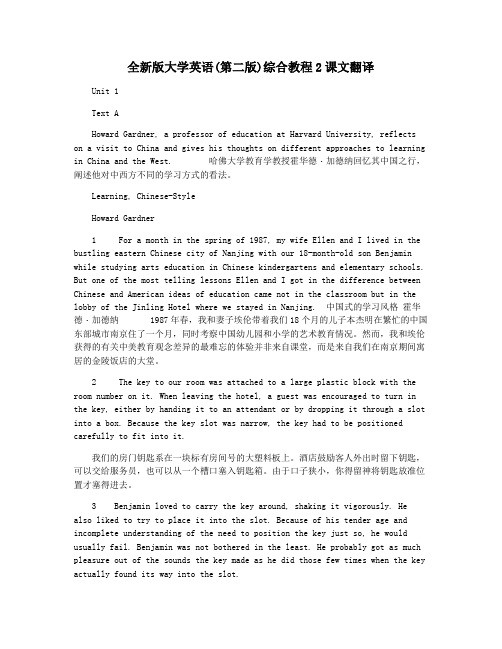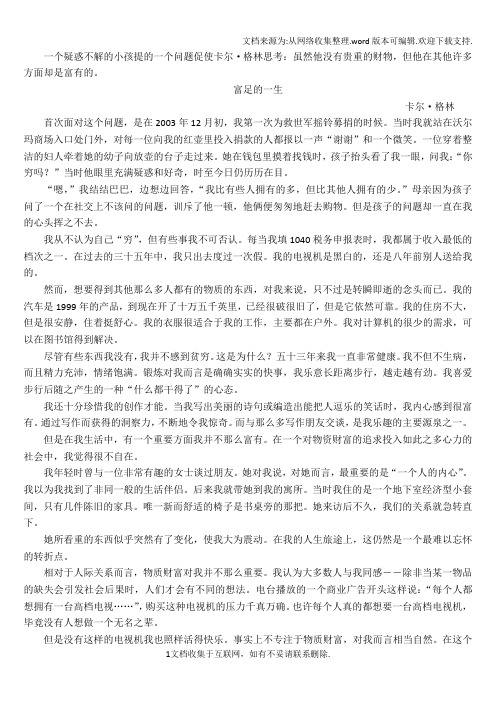数学专业英语第二版-课文翻译-converted
第二版新世纪大学英语综合教程2课文翻译

新世纪大学英语综合教程2课文翻译UNIT 1陌生人的仁慈一个夏天,我正驱车从我的家乡加利福尼亚州的塔霍湖市前往新奥尔良。
行驶到沙漠中部时,我遇到了一个正站在路边的年轻人。
他竖起拇指请求搭车,另一只手里握着一个汽油罐。
我径直从他身边开了过去。
…在这个国家曾经有一个时期,如果你对一个需要帮助的人置之不理,那你就被认为是一个愚蠢的人。
但现在,你帮助了别人,你就是一个愚蠢的人。
由于到处隐藏着歹徒、吸毒成瘾者、强奸犯和小偷,…“我不想惹麻烦”就成了民族的箴言。
驶过了几个州后,我仍然在想着那个搭便车的旅行者。
把他束手无策留在沙漠并没有让我太烦扰。
让我烦扰的是,我是多么轻易的就下了这个决定。
我甚至都没有把脚从加速器上抬起来。
还会有人再停下来么?我很想知道。
我想起布兰奇-杜包尔斯的著名的台词“我总是非常依赖陌生人的仁慈”。
…如今还会有人依赖陌生人的仁慈吗?检验此事的一个方法就是让一个人不带钱,只依靠美国同胞的好心,从一个海岸到另一个海岸去旅行。
他将发现什么样的美国人呢?谁将会给他食物、提供住处、载他一路?这个想法激起我的好奇心。
…在我步入37岁的那周,我意识到在我的一生中还从未冒过险。
因此我决定身无分文的从太平洋到大西洋旅行。
在这个金钱万能的国家,这将会是一次不花钱的旅行。
我将只接受别人提供的搭车、食物以及休息场所。
我最终的目的地将是被卡罗莱纳周的恐怖角,这是我整个旅行要克服的所有恐惧的一个象征。
1994年9月6日,我早早的起了床,动身前往金门桥。
我背上背了50镑重的行李和一个向过往的车辆展示我此行目的地的标牌“美国”。
…六周的时间,我免费搭车82次,穿越了14个省4223英里。
当我旅行时,人们总是提醒我关于其他地方的事情。
在蒙大拿州,他们告诉我要提防怀俄明州的牛仔。
在内布拉斯加州,他们说艾奥瓦州的人不像他们那么友好。
然而,我所到之处受到的是善意的款待。
我对于人们欣然帮助一个陌生人而感到吃惊,甚至当这些行为与他们自己的利益背道而驰的时候。
(完整版)全新版大学英语(第二版)综合教程3课文原文及翻译Until1-8较完整版

8 The next year we grew even more food and managed to get through the winter on firewood that was mostly from our own trees and only 100 gallons of heating oil. At that point I began thinking seriously about quitting my job and starting to freelance. The timing was terrible。பைடு நூலகம்By then, Shawn and Amy, our oldest girls were attending expensive Ivy League schools and we had only a few thousand dollars in the bank。 Yet we kept coming back to the same question: Will there ever be a better time? The answer, decidedly, was no, and so —— with my employer’s blessings and half a year’s pay in accumulated benefits in my pocket -- off I went.
染整专业英语第二版课文翻译第二单元

染整专业英语第二版课文翻译第二单元Hi, my name is Marry Fielding and I guess you could say that I am "one ina million". In other words, there are not many people like me. You see, I have a muscle disease which makes me very weak, so I can't run or climb stairs as quickly as other people. In addition, sometimes I am very clumsy and dropthings or bump into furniture. Unfortunately, the doctors don't know how to make me better, but I am very outgoing and have learned to adapt to my disability. My motto is: live One day at a time.Until I was ten years old I was the same as everyone else. I used to climb trees, swim and play football. In fact, I used to dream about playing professional football and possibly representing my country in the World Cup. Then I started to get weaker and weaker, until I could only enjoy footballfrom a bench at the stadium. In the end I went into hospital for medical tests.I stayed there for nearly three months. I think I had at least a billion tests, including one in which they cut out a piece of muscle from my leg and lookedat it under a microscope. Even after all that, no one could give my disease a name and it is difficult to know what the future holds.One problem is that I don't look any different from other people. So sometimes some children in my primary school would laugh, when I got out of breath after running a short way or had to stop and rest halfway up the stairs. Sometimes, too, I was too weak to go to school so my education suffered. Every time I returned after an absence, I felt stupid because I was behind the others.My life is a lot easier at high school because my fellow students have accepted me. The few who cannot see the real person inside my body do not make me annoyed, and I just ignore them. All in all I have a good life. I am happyto have found many things I can do, like writing and computer programming. My ambition is to work for a firm that develops computer software when I grow up. Last year invented a computer football game and a big company has decided to buy it from me. I have a very busy life with no time to sit around feelingsorry for myself. As well as going to the movies and football matches with my friends, I spend a lot of time with my pets. I have two rabbits, a parrot, a tank full of fish and a tortoise. To look after my pets properly takes a lotof time but I find it worthwhile. I also have to do a lot of work, especiallyif I have been away for a while.In many ways my disability has helped me grow stronger psychologically and become more independent. I have to work hard to live a normal life but it has been worth it. If I had a chance to say one thing to healthy children, it would be this: having a disability does not mean your life is not satisfying. So don't feel sorry for the disabled or make fun of them, and don't ignore them either. Just accept them for who they are, and give them encouragement to live as rich and full a life as you do.Thank you for reading my story.Unit 1马丁的故事嗨,我的名字就是马丁。
全新版大学英语(第二版)综合教程2课文翻译

全新版大学英语(第二版)综合教程2课文翻译Unit 1Text AHoward Gardner, a professor of education at Harvard University, reflects on a visit to China and gives his thoughts on different approaches to learning in China and the West. 哈佛大学教育学教授霍华德・加德纳回忆其中国之行,阐述他对中西方不同的学习方式的看法。
Learning, Chinese-StyleHoward Gardner1 For a month in the spring of 1987, my wife Ellen and I lived in the bustling eastern Chinese city of Nanjing with our 18-month-old son Benjamin while studying arts education in Chinese kindergartens and elementary schools. But one of the most telling lessons Ellen and I got in the difference between Chinese and American ideas of education came not in the classroom but in the lobby of the Jinling Hotel where we stayed in Nanjing. 中国式的学习风格霍华德・加德纳 1987年春,我和妻子埃伦带着我们18个月的儿子本杰明在繁忙的中国东部城市南京住了一个月,同时考察中国幼儿园和小学的艺术教育情况。
然而,我和埃伦获得的有关中美教育观念差异的最难忘的体验并非来自课堂,而是来自我们在南京期间寓居的金陵饭店的大堂。
全新版大学英语第二版综合教程2课文译文

Unit 1One way of summarizing the American position is to state that we value originality and independence more than the Chinese do. The contrast between our two cultures can also be seen in terms of the fears we both harbor. Chinese teachers are fearful that if skills are not acquired early, they may never be acquired; there is, on the other hand, no comparable hurry to promote creativity. American educators fear that unless creativity has been acquired early, it may never emerge; on the other hand, skills can be picked up later.美国人的立场可以归纳起来这么说,咱们比中国人更重视创新和自立。
咱们两种文化的不同也可以从咱们各自所怀的忧虑中显示出来。
中国老师担忧,若是年轻人不及早掌握技艺,就有可能一生掌握不了;另一方面,他们并非一样地急于增进创造力的发展。
美国教育工作者则担忧,除非从一开始就发展创造力,不然创造力就有可能永再也不现;而另一方面,技艺可于往后取得。
However, I do not want to overstate my case. There is enormous creativity to be found in Chinese scientific, technological and artistic innovations past and present. And there is a danger of exaggerating creative breakthroughs in the West. When any innovation is examined closely, its reliance on previous achievements is all too apparent (the "standing on the shoulders of giants" phenomenon).但我并非想夸大其辞。
全新版大学英语第二版第二册Unit2课文译文及参考答案

一个疑惑不解的小孩提的一个问题促使卡尔·格林思考:虽然他没有贵重的财物,但他在其他许多方面却是富有的。
富足的一生卡尔·格林首次面对这个问题,是在2003年12月初,我第一次为救世军摇铃募捐的时候。
当时我就站在沃尔玛商场入口处门外,对每一位向我的红壶里投入捐款的人都报以一声“谢谢”和一个微笑。
一位穿着整洁的妇人牵着她的幼子向放壶的台子走过来。
她在钱包里摸着找钱时,孩子抬头看了我一眼,问我:“你穷吗?”当时他眼里充满疑惑和好奇,时至今日仍历历在目。
“嗯,”我结结巴巴,边想边回答,“我比有些人拥有的多,但比其他人拥有的少。
”母亲因为孩子问了一个在社交上不该问的问题,训斥了他一顿,他俩便匆匆地赶去购物。
但是孩子的问题却一直在我的心头挥之不去。
我从不认为自己“穷”,但有些事我不可否认。
每当我填1040税务申报表时,我都属于收入最低的档次之一。
在过去的三十五年中,我只出去度过一次假。
我的电视机是黑白的,还是八年前别人送给我的。
然而,想要得到其他那么多人都有的物质的东西,对我来说,只不过是转瞬即逝的念头而已。
我的汽车是1999年的产品,到现在开了十万五千英里,已经很破很旧了,但是它依然可靠。
我的住房不大,但是很安静,住着挺舒心。
我的衣服很适合于我的工作,主要都在户外。
我对计算机的很少的需求,可以在图书馆得到解决。
尽管有些东西我没有,我并不感到贫穷。
这是为什么?五十三年来我一直非常健康。
我不但不生病,而且精力充沛,情绪饱满。
锻炼对我而言是确确实实的快事,我乐意长距离步行,越走越有劲。
我喜爱步行后随之产生的一种“什么都干得了”的心态。
我还十分珍惜我的创作才能。
当我写出美丽的诗句或编造出能把人逗乐的笑话时,我内心感到很富有。
通过写作而获得的洞察力,不断地令我惊奇。
而与那么多写作朋友交谈,是我乐趣的主要源泉之一。
但是在我生活中,有一个重要方面我并不那么富有。
在一个对物资财富的追求投入如此之多心力的社会中,我觉得很不自在。
(完整版)全新版大学英语(第二版)综合教程2课文翻译
Unit 1Text AHoward Gardner, a professor of education at Harvard University, reflects on a visit to China and gives his thoughts on different approaches to learning in China and the West.哈佛大学教育学教授霍华德·加德纳回忆其中国之行,阐述他对中西方不同的学习方式的看法。
Learning, Chinese-StyleHoward Gardner 1 For a month in the spring of 1987, my wife Ellen and I lived in the bustling eastern Chinese city of Nanjing with our 18-month-old son Benjamin while studying arts education in Chinese kindergartens and elementary schools. But one of the most telling lessons Ellen and I got in the difference between Chinese and American ideas of education came not in the classroom but in the lobby of the Jinling Hotel where we stayed in Nanjing.中国式的学习风格霍华德·加德纳1987年春,我和妻子埃伦带着我们18个月的儿子本杰明在繁忙的中国东部城市南京住了一个月,同时考察中国幼儿园和小学的艺术教育情况。
然而,我和埃伦获得的有关中美教育观念差异的最难忘的体验并非来自课堂,而是来自我们在南京期间寓居的金陵饭店的大堂。
(2020年7月整理)新编大学英语第二版Book2 Unit1-4课文原文加翻译.doc
新编大学英语第二版Book2 Unit1-4课文原文加翻译Unit 1 A Good Heart to Lean OnMore than I realized, Dad has helped me keep my balance.[1] When I was growing up, I was embarrassed to be seen with my father. He was severely crippled and very short, and when we would walk together, his hand on my arm for balance , people would stare. I would be ashamed of the unwanted attention. If he ever noticed or was bothered, he never let on.[2] It was difficult to coordinate our steps—his halting, mine impatient —and because of that, we didn't say much as we went along. But as we started out, he always said, “You set the pace. I will try to adjust to you. ”[3] Our usual walk was to or from the subway, which was how he got to work. He went to work sick, and despite nasty weather. He almost never missed a day, and would make it to the office even if others could not. It was a matter of pride for him.[4] When snow or ice was on the ground, it was impossible for him to walk, even with help. At such times my sisters or I would pull him through the streets of Brooklyn , N.Y., on a child's sleigh to the subway entrance. Once there, he would cling to the handrail until he reached the lower steps that the warmer tunnel air kept ice-free.In Manhattan the subway station was the basement of his office building, and he would not have to go outside again until we met him in Brooklyn on his way home..[5] When I think of it now, I marvel at how much courage it must have taken for a grown man to subject himself to such indignity and stress. And I marvel at how he did it—without bitterness or complaint.[6] He never talked about himself as an object of pity, nor did he show any envy of the more fortunate or able . What he looked for in others was a “good heart”, and if he found one, the owner was good enough for him.[7] Now that I am older, I believe that is a proper standard by which to judge people , even though I still don't know precisely what a “good heart” is. But I know the times I don't have one myself.[8] Unable to engage in many activities, my father still tried to participate in some way. When a local baseball team found itself without a manager , he kept it going. He was a knowledgeable baseball fan and often took me to Ebbets Field to see the Brooklyn Dodgers play. He liked to go to dances and parties, where he could have a good time just sitting and watching.[9] On one memorable occasion a fight broke out at a beach party, with everyone punching and shoving .He wasn't content to sit and watch, but he couldn't stand unaided on the soft sand. In frustration he began to shout, “I'll fight anyone who will sit down with me! I'll fight anyone who will sit down with me! ”[10] Nobody did. But the next day people kidded him by saying it was the first time any fighter was urged to take a dive even before the bout began.[11] I now know he participated in some things vicariously through me, his only son. When I played ball (poorly), he “played” too. When I joined the Navy, he “joined” too. And when I came home on leave, he saw to it that I visited his office. Introducing me, he was really saying, “This is my son, but it is also me, and I could have done this, too, if things had been different. ” Those wordswere never said aloud.[12] He has been gone many years now, but I think of him often. I wonder if he sensed my reluctance to be seen with him during our walks. If he did, I am sorry I never told him how sorry I was, how unworthy I was, how I regretted it. I think of him when I complain about trifles, when I am envious of anoth er's good fortune, when I don't have a “good heart”.[13] At such times I put my hand on his arm to regain my balance, and say, “You set the pace. I will try to adjust to you.” ( 703 words)【译文】善良之心,久久相依1 随着我渐渐长大,当别人看见我和爸爸在一起,我会觉得很尴尬。
数学专业英语翻译
第一段翻译(2):what is the exact valueo f the number pai?a mathematici an made an experi mentin orderto find his own estima tionof the number pai.in his experi ment,he used an old bicycl e wheelof diamet er 63.7cm.he marked the pointon the tire wherethe wheelwas touchi ng the ground and he rolled the wheelstraig ht aheadby turnin g it 20 times.next,he measur ed the distan ce travel ed by the wheel,whichwas 39.69 meters.he divide d the number3969 by 20*63.7 and obtain ed 3.115384615 as an approx imati on of the number pai.of course,this was just his estima te of the number pai and he was awarethat it was not very accura te.数π的精确值是什么?一位数学家做了实验以便找到他自己对数π的估计。
在试验中,他用了一直径63.1厘米的旧自行车轮。
他在车轮接触地面的轮胎上做了标记,而且将车轮向前转动20次。
接下来,他测量了车轮经过的距离,是39.69米。
他用3969除20*63.7得到了数π的近似值3.115384615。
全新版大学英语5(第二版)UNIT 1-7课文翻译英汉对照
UNIT 1 One Writer’s Beginnings1 I learned from the age of two or three that any room in our house, at any time of day, was there to read in, or to be read to. My mother read to me. She’d read to me in the big bedroom in the mornings, when we were in her rocker together, which ticked in rhythm as we rocked, as though we had a cricket accompanying the story. She’d read to me in the dining room on winter afternoons in front of the coal fire, with our cuckoo clock ending the story with “Cuckoo,”and at night when I’d got in my own bed. I must have given her no peace. Sometimes she read to me in the kitchen while she sat churning, and the churning sobbed along with any story. It was my ambition to have her read to me while I churned; once she granted my wish, but she read off my story before I brought her butter. She was an expressive reader. When she was reading “Puss in Boots,” for instance, it was impossible not to know that she distrusted all cats.我从两三岁起就知道,家中随便在哪个房间里,白天无论在什么时间,都可以念书或听人念书。
- 1、下载文档前请自行甄别文档内容的完整性,平台不提供额外的编辑、内容补充、找答案等附加服务。
- 2、"仅部分预览"的文档,不可在线预览部分如存在完整性等问题,可反馈申请退款(可完整预览的文档不适用该条件!)。
- 3、如文档侵犯您的权益,请联系客服反馈,我们会尽快为您处理(人工客服工作时间:9:00-18:30)。
2.4 整数、有理数与实数4-A Integers and rational numbersThere exist certain subsets of R which are distinguished because they have special properties not shared by all real numbers. In this section we shall discuss such subsets, the integers and the rational numbers.有一些R 的子集很著名,因为他们具有实数所不具备的特殊性质。
在本节我们将讨论这样的子集,整数集和有理数集。
To introduce the positive integers we begin with the number 1, whose existence is guaranteed by Axiom 4. The number 1+1 is denoted by 2, the number 2+1 by 3, and so on. The numbers 1,2,3,…, obtained in this way by repeated addition of 1 are all positive, and they are called the positive integers.我们从数字 1 开始介绍正整数,公理 4 保证了 1 的存在性。
1+1 用2 表示,2+1 用3 表示,以此类推,由 1 重复累加的方式得到的数字 1,2,3,…都是正的,它们被叫做正整数。
Strictly speaking, this description of the positive integers is not entirely complete because we have not explained in detail what we mean by the expressions “and so on”, or “repeated addition of 1”.严格地说,这种关于正整数的描述是不完整的,因为我们没有详细解释“等等”或者“1的重复累加”的含义。
Although the intuitive meaning of expressions may seem clear, in careful treatment of the real-number system it is necessary to give a more precise definition of the positive integers. There are many ways to do this. One convenient method is to introduce first the notion of an inductive set.虽然这些说法的直观意思似乎是清楚的,但是在认真处理实数系统时必须给出一个更准确的关于正整数的定义。
有很多种方式来给出这个定义,一个简便的方法是先引进归纳集的概念。
DEFINITION OF AN INDUCTIVE SET. A set of real number s is cal led an i n ductiv e set if it has the following two properties:(a) The number 1 is in the set.(b) For every x in the set, the number x+1 is also in the set.For example, R is an inductive set. So is the set . Now we shall define the positive integers to be those real numbers which belong to every inductive set.现在我们来定义正整数,就是属于每一个归纳集的实数。
Let P d enote t he s et o f a ll p ositive i ntegers. T hen P i s i tself a n i nductive set b ecause (a) i t contains 1, a nd (b) i t c ontains x+1 w henever i t c ontains x. Since the m embers o f P b elong t o e very inductive s et, w e r efer t o P a s t he s mallest i nductive set.用 P 表示所有正整数的集合。
那么 P 本身是一个归纳集,因为其中含 1,满足(a);只要包含x 就包含x+1, 满足(b)。
由于 P 中的元素属于每一个归纳集,因此 P 是最小的归纳集。
This property of P forms the logical basis for a type of reasoning that mathematicians call proof by induction, a detailed discussion of which is given in Part 4 of this introduction.P 的这种性质形成了一种推理的逻辑基础,数学家称之为,在介绍的第四部分将给出这种方法的详细论述。
归纳证明The negatives of the positive integers are called the negative integers. The positive integers, together with the negative integers and 0 (zero), form a set Z which we call simply the set of integers.正整数的相反数被叫做负整数。
正整数,负整数和零构成了一个集合 Z,简称为整数集。
Ina t horough t reatment o f t he r eal-number s ystem, i t w ouldb e n ecessary a t t his stage to prove certain theorems about integers. For example, the sum, difference, or product of two integersis an integer, but the quotient of two integers need not to ne an integer. However, we shall not enter into the details of such proofs. 在实数系统中,为了周密性,此时有必要证明一些整数的定理。
例如,两个整数的和、差和积仍是整数,但是商不一定是整数。
然而还不能给出证明的细节。
Quotients of integers a/b (where b≠0) are called rational numbers. The set of rational numbers, denoted by Q, contains Z as a subset. The reader should realize that all the field axioms and the order axioms are satisfied by Q. For this reason, we say that the set of rational numbers is an ordered field. Real numbers that are not in Q are called irrational.整数 a 与 b 的商被叫做有理数,有理数集用 Q 表示,Z 是 Q 的子集。
读者应该认识到 Q 满足所有的域公理和序公理。
因此说有理数集是一个有序的域。
不是有理数的实数被称为无理数。
4-B Geometric interpretation of real numbers as points on a lineThe reader is undoubtedly familiar with the geometric interpretation of real numbers by means of points on a straight line. A point is selected to represent 0 and another, to the right of 0, to represent 1, as illustrated in Figure 2-4-1. This choice determines the scale.毫无疑问,读者都熟悉通过在直线上描点的方式表示实数的几何意义。
如图 2-4-1 所示,选择一个点表示 0,在 0 右边的另一个点表示 1。
这种做法决定了刻度。
If one adopts an appropriate set of axioms for Euclidean geometry, then each real number corresponds to exactly one point on this line and, conversely, each point on the line corresponds to one and only one real number.如果采用欧式几何公理中一个恰当的集合,那么每一个实数刚好对应直线上的一个点,反之,直线上的每一个点也对应且只对应一个实数。
For this reason the line is often called the real line or the real axis, and it is customaryto use the words real number and point interchangeably. Thus we often speak of the point x rather than the point corresponding to the real number.为此直线通常被叫做实直线或者实轴,习惯上使用“实数”这个单词,而不是“点”。
